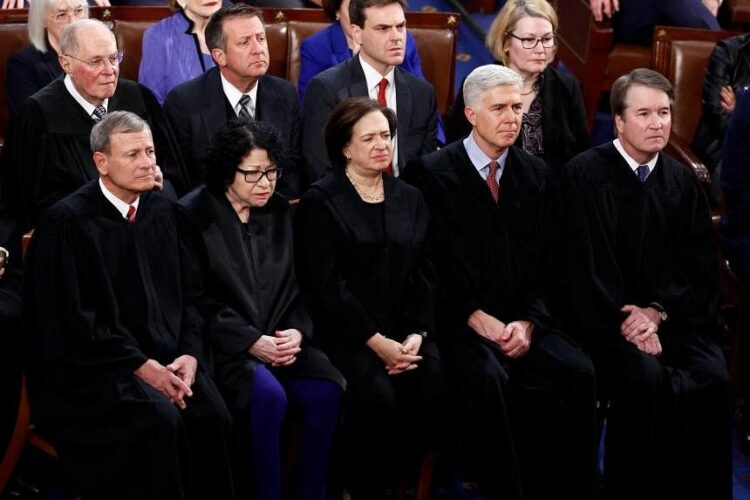WASHINGTON, June 7 (Reuters) — U.S. Supreme Court justices have been scrutinized as their 2023 annual financial disclosure forms reveal various luxurious gifts and substantial earnings from book deals.
The disclosures, released on Friday, offer a glimpse into the external financial activities and perks enjoyed by the nation’s highest judicial figures, prompting discussions about the need for stricter ethical oversight.
The financial forms highlight various benefits that underscore the privileges associated with their positions. Among the most eye-catching disclosures are extravagant trips and high-value gifts that have raised ethical questions.
Conservative Justice Clarence Thomas reported previously undisclosed “food and lodging” paid for by Republican megadonor Harlan Crow, including a luxurious Bali hotel and accommodations at a private club in California.
Such revelations add to Thomas’s criticism over unreported luxury trips and gifts from affluent benefactors.
Liberal Justice, Ketanji Brown Jackson, also made headlines with her financial disclosures, which included four Beyoncé concert tickets valued at $3,711.84 and artwork worth $12,500 for her chambers.
These high-profile gifts, alongside substantial advances and royalties from book deals, illustrate the financial benefits that justices can accrue beyond their judicial salaries. Jackson’s nearly $900,000 advance for her upcoming memoir, “Lovely One,” further underscores the lucrative opportunities available to the justices in the literary market.
The financial disclosures have intensified calls for more stringent ethical standards and transparency in the Supreme Court. Critics argue that accepting such high-value gifts and external earnings could compromise the judiciary’s impartiality and integrity.
Gifts and Accommodations Unveiled
Conservative Justice Clarence Thomas, who has been at the center of criticism for failing to report luxury trips funded by businessman and Republican donor Harlan Crow, revised his 2019 financial disclosure to acknowledge “food and lodging” provided at a Bali hotel and a private club in Sonoma County, California. This admission follows reports that Thomas had previously accepted lavish trips, including a stay on Crow’s superyacht and private jet travel to Indonesia.
Justice Thomas’s revised disclosure omits details about the entirety of his Indonesia trip, raising further questions. Reports from ProPublica highlighted that the trip involved more than just a one-night hotel stay, including extensive travel on Crow’s private jet and superyacht for an islands tour.
High-Value Concert Tickets and Art
Liberal Justice Ketanji Brown Jackson reported receiving four tickets to a Beyoncé concert valued at $3,711.84. These tickets, gifted by the globally renowned singer, highlight the unique and often high-profile nature of the justices’ financial activities.
The substantial value of these concert tickets underscores the personal perks that accompany the role and raises questions about the appropriateness of accepting such gifts from prominent figures. The Beyoncé tickets from an internationally acclaimed artist contribute to the broader narrative of the justices’ access to exclusive and extravagant experiences.
In addition to the concert tickets, Justice Jackson also disclosed receiving artwork worth $12,500 for her Supreme Court chambers.
This artwork, likely intended to enhance her professional environment’s aesthetic and cultural ambiance, reflects the intersection of personal appreciation and professional enhancement.
The disclosure of such high-value items emphasizes the diverse nature of the gifts that justices can receive, blending personal enjoyment with professional enrichment.
Accepting these valuable gifts brings to light the broader ethical considerations surrounding the financial activities of Supreme Court justices.
It prompts discussions about the potential influence of such gifts on judicial impartiality and the necessity for stricter guidelines and transparency to maintain public trust in the judiciary.
These disclosures underscore the ongoing debate about the ethical boundaries and responsibilities of the nation’s highest judicial figures.
Delays and Extensions
Conservative Justice Samuel Alito, currently entangled in multiple controversies, received a 90-day extension for his financial filing. Alito requests more time amid intense scrutiny over his involvement in cases related to the 2020 presidential election and the January 6 Capitol riot.
His decision to participate in these politically sensitive cases without recusal has drawn significant criticism, bringing the ethical standards of the Supreme Court into question.
Justice Alito’s financial activities and his controversial case involvements have highlighted the complex ethical landscape the justices navigate. Critics argue that his refusal to step aside from cases with substantial political implications undermines the court’s perceived impartiality.
This controversy is further fueled by reports of flags associated with Donald Trump’s “Stop the Steal” movement being flown at his homes, which Alito defended by stating that the flags were flown by his wife, unaware of their political connotations.
The extension for Alito’s financial disclosure has amplified calls for more stringent ethical guidelines and oversight mechanisms within the Supreme Court. The justices have the discretion to decide on their recusal, a policy many believe lacks sufficient accountability. Alito’s situation underscores the necessity for reforms that could ensure greater transparency and trust in the judiciary.
As the justices continue to face increasing scrutiny, the debate over implementing a binding code of conduct gains momentum. Legislators and advocacy groups push for measures that would mandate the disclosure of financial dealings and gifts and clear recusal standards to prevent conflicts of interest. Alito’s delayed financial disclosure, amid his ongoing controversies, serves as a focal point in the broader discussion on judicial ethics and the integrity of the U.S. Supreme Court.
The disclosures also revealed significant income from book deals, underscoring the lucrative opportunities available to the justices beyond their official salaries. Justice Jackson reported an advance of $893,750 for her upcoming memoir “Lovely One,” set for release in September. This advance is among the highest reported and underscores the substantial financial gains justices can achieve through publishing.
Justice Brett Kavanaugh listed $340,000 in royalties from Javelin Group and Regnery Publishing, with a memoir expected to be published in the coming years. The book is anticipated to cover his contentious confirmation hearing, which included allegations of sexual misconduct, accusations he has denied.
Conservative Justice Neil Gorsuch and liberal Justice Sonia Sotomayor also reported significant royalty incomes, with Gorsuch earning $250,000 and Sotomayor nearly $87,000. These book deals supplement their judicial salaries, which for 2023 are $298,500 for associate justices and $312,200 for Chief Justice John Roberts.
The financial disclosures come amidst increasing calls for stricter ethical standards and greater transparency for Supreme Court justices. In November, the justices adopted their first code of conduct, which critics argue falls short of promoting sufficient transparency and accountability. The new code does not include an external enforcement mechanism, leaving the justices to decide on recusal from cases.
Justice Thomas, who cited security concerns following the leak of the court’s decision to overturn the constitutional right to abortion, reported no travel paid by others in 2023. His previous disclosures included trips to Dallas, Texas, and New York’s Adirondack Mountains.
Justice Alito, a key figure in the court’s conservative majority, defended the presence of flags associated with Donald Trump’s “Stop the Steal” movement at his homes. He stated that the flags were flown by his wife, who was unaware of their political significance. Alito’s refusal to recuse himself from related cases has intensified scrutiny over the court’s ethical standards.
Legislative Push for Reforms
In response to the ongoing controversies, some Democratic lawmakers have renewed their calls for legislation requiring the Supreme Court to adopt a binding code of conduct with enforceable provisions. This push addresses concerns over the lack of external oversight and the potential for conflicts of interest among the justices.
The proposed legislation would mandate the justices to disclose the value of travel-related gifts and ensure that recusal decisions are subject to review by an independent body. However, the prospect of such legislation passing in a closely divided Congress remains uncertain.
The revelations from the 2023 financial disclosures have sparked widespread media coverage and public debate. Critics argue that the acceptance of high-value gifts and the substantial earnings from book deals raise questions about the impartiality and integrity of the justices. Proponents of stricter ethical standards emphasize the need for greater transparency to maintain public trust in the judiciary.
In contrast, supporters of the current system argue that the justices’ external earnings do not necessarily compromise their judicial responsibilities. They highlight the importance of acknowledging the financial realities of public service and the benefits of allowing justices to engage in lawful external activities.
The 2023 financial disclosures of U.S. Supreme Court justices offer a detailed view of the financial benefits and external engagements enjoyed by the nation’s highest judicial figures. As the justices continue to face scrutiny over their ethical standards, the ongoing debate underscores the delicate balance between maintaining judicial integrity and recognizing the financial aspects of public service. The push for legislative reforms and the adoption of stricter ethical guidelines will likely remain central to discussions on the future of the Supreme Court’s transparency and accountability.
The latest disclosures provide insights into the justices’ personal and professional lives and highlight the ongoing need for robust ethical standards to ensure the judiciary remains a trusted and impartial pillar of the American legal system.










